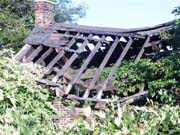Robert Grimm, assistant engineer for the New Jersey Parking Authority, has asked the Secaucus religious community to give its blessing to plans that would leave bodies under the site of a proposed New Jersey Turnpike exit off New County Road.
Last August, Turnpike officials discovered an old graveyard as they began the construction of the $225 million Turnpike interchange that will service the Secaucus Transfer Rail Station commonly called Allied Junction. Workers uncovered about 600 to 900 bodies.
Three of the four religious leaders have agreed to give the Turnpike permission to build over the bodies.
“We have agreed among ourselves that the most appropriate solution to the situation that potentially involves disturbing some portion of the old potter’s field for Turnpike construction would be to leave any human remains undisturbed, to rebury any remains that are uncovered in the project and elsewhere on the site, and to erect a fitting memorial to those who lived and died in the county facilities,” Rev. Mark Lewis, Rev. Will Moser and Msgr. Donald Guenther wrote in a letter to the Turnpike Authority.
A report done for the Turnpike in 1999 on the site said the burial ground was associated with the former Hudson County facilities at Laurel Hill (a prison, senior citizen building and mental hospital), but according to town historian Dan McDonough, the history of the grave yard may have its roots in the original poor farm located in the area. Old Bergen County, which now comprises modern Passaic and Bergen counties, acquired 200 acres in the late 1700s for a poor farm. In 1845, the new county of Hudson took on the site for its own poorhouse, but only after about 10 years of bickering did it do anything with the land – at which point it began to set up county institutions on the spot. These include a new and old almshouse, a county jail, a lunatic asylum, Hudson County General Hospital, a tuberculosis hospital, a boys camp, a Catholic and a Protestant church, a unit of the Hudson County Fire Department and storage buildings for supplies and electronic equipment. The cemetery the turnpike uncovered could date back to 1845 when the county set up its poor house.
“It seems a foolish waste of money to spend $1 million relocating those old bones when many of them have already been scattered all over the place,” said Rev. Lewis during a telephone interview on March 5.
But Rev. Will Henkel of the First Reformed Church raised strong objections to continuing the work.
“Do I understand that when we talk about leaving the human remains undisturbed we are talking about covering them over with concrete?” Henkel asked, pondering what kind of memorial would be fitting and whether or not it would be removed at some later time. The Turnpike Authority in recent years has maintained a policy of removing even memorials of more famous people from its rest areas.
“The thought of someone 50 years from now removing or paving over such a memorial, a marker for a place where death and burial took place, for strictly commercial reasons is unthinkable,” he said, comparing it to building an oil rig over the U.S.S. Arizona.
Jerry Colangiovanni, public information officer for the Turnpike Authority, said the Turnpike originally constructed a bridge over the potters’ field when the roadway was constructed in the early 1950s. When engineers started studies for a new exit to be constructed in the area to access the Secaucus Rail Transfer Station, they came upon remains.
“During excavation, they did a sampling in the area and came upon some remains,” he said. “Work stopped. A firm was hired to investigate and get background. But it is been difficult to identify who was buried there or track family lineage. We knew that some of the people worked for or lived in Hudson County.”
He said the final determination would be up to the attorney general’s office and the courts.
“We are working with the state attorney general’s office as to the best way to proceed,” he said. “We are currently waiting on their recommendations.”
While Hudson County officials claim records no longer exist for those buried at the site, McDonough said during his research in the area he had seen the books on the burial sight in the possession of Former County Executive Robert Janiszewski. What happened to the records over the last few years, no one seems to know.
Henkel said the dead there might also be honored more fittingly if the Turnpike agreed to set up some kind of home for the aging.
“When I recently tried to place a person in a homeless shelter, I was shocked to find that there were no beds in Hudson or Bergen counties on that occasion and on most occasions these days,” he said. “Is there some way we could memorialize those buried at Snake Hill by providing for the outcasts of this day and age? That would be a fitting memorial to me.”
